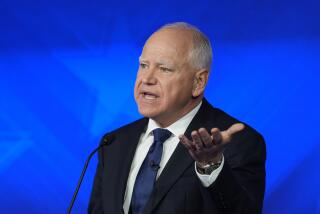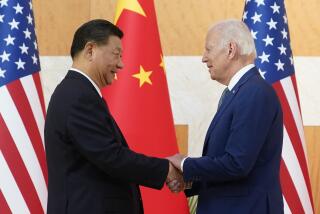Eager to Improve Ties, China Seeks Baker Visit
WASHINGTON — Will Secretary of State James A. Baker III--who has not set foot in China since the 1989 crackdown on Tian An Men Square protests--stop in Beijing when he makes a tour of Asia this November?
Over the last two years, the leadership in Beijing has repeatedly sought a visit by the American secretary of state.
“It’s symbolic,” explained one Chinese source with firsthand knowledge of the Chinese government’s viewpoint. “The ban on high-level visits was one of the sanctions imposed by the United States in 1989. A Baker trip would represent a return to normal relations (between China and the United States).”
White House National Security Adviser Brent Scowcroft made two visits to China in 1989, but those trips were arranged secretly and did not carry the same weight of diplomatic symbolism as would a formal visit by the secretary of state.
According to U.S. sources, on the eve of the U.N. Security Council vote last November authorizing the use of force against Iraq, China avoided saying how it would vote while it sought unsuccessfully to win Baker’s agreement for a trip to Beijing.
The secretary of state refused to go along with the idea, although U.S. officials agreed to let Chinese Foreign Minister Qian Qichen visit Washington and meet with President Bush. After those negotiations, China abstained from the vote on the U.N. resolution authorizing the use of force, neither vetoing the crucial authorization nor voting for it.
Last summer, China tried again to get Baker to stop in China, but U.S. officials were reportedly unable to get firm promises that China would curb its arms exports as Washington had asked.
Baker is now planning another transpacific trip in November, and U.S. and diplomatic sources in Washington say China has been lobbying intensively for a stop in Beijing.
“The Chinese have expressed their eagerness to improve their relations with the United States,” said a Japanese diplomat here. “Japan’s relations with China cannot go forward too much when the U.S.-Chinese relationship is stuck.” He declined to take any position on whether the U.S. secretary of state should make the trip.
A senior U.S. official said the Administration is willing to consider opening the way for the secretary of state to visit China, but only if the leadership in Beijing agrees to changes in its arms-export and human-rights policies.
Specifically, the United States has been trying to persuade China to sign the Nuclear Non-Proliferation Treaty limiting nuclear arms exports and to abide by the Missile Technology Control Regime restricting missiles. It has been trying to win assurances that China will not sell a newly developed class of missiles to Syria.
“A Baker visit would make a lot of sense under the right circumstances, ones where it actually advances the relationship,” the official said, “(but) it would be foolhardy to ask the secretary, or have the secretary on his own, go under circumstances where it harms the relationship, doesn’t advance progress” toward the arms treaties or Middle East arms control “and would appear to be a setback for human rights.
“Those are the conditions,” he said. “Thus far, the conditions haven’t appeared, but we are not without hope that they might.”
More to Read
Sign up for Essential California
The most important California stories and recommendations in your inbox every morning.
You may occasionally receive promotional content from the Los Angeles Times.









